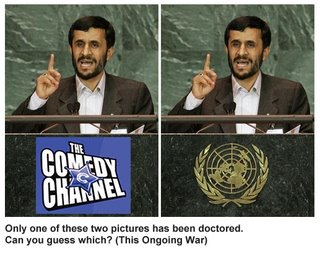 Item 1: Iranian president: Israel's destruction is only solution to Mideast crisis
Item 1: Iranian president: Israel's destruction is only solution to Mideast crisisIranian President Mahmoud Ahmadinejad said Thursday that the only solution to the Middle East problem is the destruction of Israel. "The primary medicine for the problems of the region and the world is the annihilation of the Zionist regime," Ahmadinejad said.Item 2: French FM Hails Iran's 'Stabilizing' Role in ME
TEHRAN (Fars News Agency)- Iran is a key player in the Middle East and "plays an important stabilizing role" in the region, French Foreign Minister Philippe Douste-Blazy said. "It is clear that we cannot accept a destabilization of Lebanon that could lead to a destabilization of the region. In the region there is a great country like Iran which is respected and which plays an important stabilizing role in the region," he said during a visit to Beirut.Item 3: How dangerous are Items 1 and 2?
As slightly-amusing as these two pieces of imbecilic logic might be under normal circumstances, they're neither funny nor trivial here and now. The challenge is to keep in mind that:
- Item 1 reports today's speech by a head of state who recently addressed the United Nations, and whose country is developing nuclear weapons.
- Item 2 reports last week's speech by a top-level politician from Europe's largest country - a country which has veto power over the UN Security Council and which has a track record of self-aggrandizing, irresponsible meddling in other people's affairs.

1 comment:
As this Reuters report shows, no one in the official Moslem world sees the humor. In fact, Ahmeggedonjihad is hailed there as a hero. Note that the OIC comprises nearly one third of the entire United Nations!
Iran, other Islamic nations demand end to Mideast war
http://news.yahoo.com/s/nm/20060803/wl_nm/mideast_lebanon_oic_dc
By Jonathan Lyons, Asia Security Correspondent Thu Aug 3, 8:33 AM ET
PUTRAJAYA, Malaysia (Reuters) -
Iran's President Mahmoud Ahmadinejad and other Muslim leaders demanded a halt on Thursday to Israeli attacks on Lebanon and Gaza and said they wanted to strengthen U.N. peacekeeping forces in the area.
Wary of restive populations back home, and aghast at the toll in heavily Muslim southern Lebanon, a special session of the Organization of the Islamic Conference also called for an investigation into
Israel's "violations" of international law and demanded the Jewish state pay compensation.
But it was Ahmadinejad, his hardline views on Israel reinvigorated by public backing from Iran's supreme clerical leader, who animated the emergency meeting as it strove to get the Muslim world's voice heard above the diplomatic din.
"Although the main cure (to the situation) is the elimination of the Zionist regime, in this stage an immediate ceasefire should be implemented," Ahmadinejad, who previously has said Israel should be wiped off the map, told the closed door meeting.
"Britain and America, as the main associates of the Zionist regime in its offensive to Lebanon, should compensate Lebanon's damages. Those governments should answer for their crimes in Lebanon," he said in his speech, a copy of which was made available by Iranian diplomats.
And he urged Islamic and Arab nations to cut all political and economic ties to the Jewish state.
The United States accuses Iran of providing material support for Hizbollah, whose rocket attacks Israel has vowed to quash once and for all. Tehran says it provides only moral backing, not cash or weaponry.
Ahmadinejad has clearly struck a chord in parts of the Muslim world. He was treated like something of a rock star during a recent visit to Indonesia, particularly on college campuses.
PROSPECTS FOR SUCCESS UNCLEAR
But it was unclear just how much success, if any, Muslims may have in winning the backing the United States, Israel's superpower ally, for a ceasefire.
Israel's offensive against Hizbollah in Lebanon has killed more than 900 people and wounded 3,000 with a third of the casualties children under 12, Lebanese Prime Minister Fouad Siniora said in a video message to the conference.
He said a quarter of the population, or one million people, had been displaced.
An OIC declaration after the meeting said the group may seek to circumvent the Security Council and U.S. veto power, and take the matter straight to the General Assembly.
So far Washington has resisted demands for a swift ceasefire, supporting Israel's contention that a settlement was needed before the guns could fall silent.
After the session closed, Malaysian Prime Minister Abdullah Ahmad Badawi said the OIC had agreed to a Lebanese request to strengthen U.N. "Blue Helmet" peacekeeping forces for southern Lebanon.
"They would like to see more OIC countries participate. We support that," said Abdullah, who hosted the gathering of select OIC members. That appeared to stop short of some members' demands that a Muslim peacekeeping force take shape.
The meeting began hours earlier on a note of frustration. Bangladeshi Prime Minister Khaleda Zia asked: "The question that may come up is why this meeting could not be convened earlier."
Malaysia's Abdullah said further delay in halting the bloodshed would only feed the forces of radicalism.
"We fear a new wave of angry people who might join the ranks of the terrorists to take their own action to show how angry they are," he said.
Among those attending were the president of Indonesia, the world's most populous Muslim nation, and the prime ministers of Muslim powerhouses Turkey and Pakistan.
(Additional reporting by Jalil Hamid, Clarence Fernandez, and Alireza Ronaghi)
Post a Comment